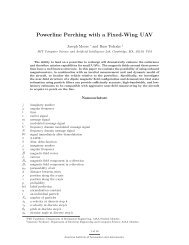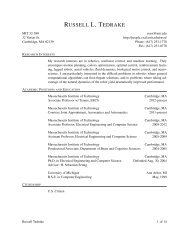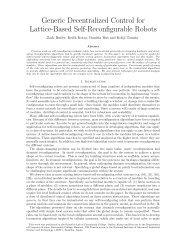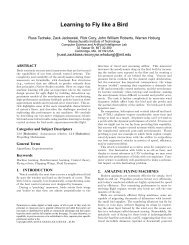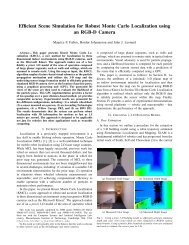Online Social Networks and E-Commerce - MIT Computer Science ...
Online Social Networks and E-Commerce - MIT Computer Science ...
Online Social Networks and E-Commerce - MIT Computer Science ...
You also want an ePaper? Increase the reach of your titles
YUMPU automatically turns print PDFs into web optimized ePapers that Google loves.
Clarence Lee <strong>and</strong> Shirley Fung<br />
Critics may argue that the reason why there are many different st<strong>and</strong>ards is that not all information has<br />
the same level of sensitivity, <strong>and</strong> should not deserve the same kind of protection. However, as data<br />
become more connected through data mining <strong>and</strong> other kinds of data analyses, it would become difficult<br />
to determine which provision is applicable. In the digital age, passing <strong>and</strong> connecting of data is a lot easier<br />
than the age of paper records. No longer protected by practical obscurity, sensitive digital information can<br />
flow to other kinds of information very quickly. It is often hard to separate things such as an individual’s<br />
internet logs <strong>and</strong> library records.<br />
Alternative Policies<br />
Recordable online activity with the influx of personal data in social networking Web sites has changed the<br />
way that we should view privacy on the Internet. Some may argue that online activities should not be<br />
protected at all, because society no longer has an expectation of privacy on the Internet whatsoever.<br />
Nevertheless, it is hard to believe that society is ready to ab<strong>and</strong>on all expectation of privacy just because<br />
any activity is logged on the Internet. Perhaps we can no longer use the same metaphors to describe how<br />
different kinds of digital information are protected. It is important to reconsider what online activities are<br />
in the views of the Fourth Amendment.<br />
In the judicial opinion of the U.S. Supreme Court case Katz vs. United States, it is clear that electronic<br />
surveillance of data stored by a third party is still considered a legitimate intrusion because "the Fourth<br />
Amendment protects people, not places” (Katz vs. United States, 1967). If this is so, it becomes a question<br />
of whether consumers have a reasonable expectation of privacy with their online data <strong>and</strong> activity. In a<br />
small survey conducted at the Massachusetts Institute of Technology, all respondents, eight students <strong>and</strong><br />
staff members expressed discomfort of the government being able to obtain information stored by<br />
Amazon <strong>and</strong> Facebook.<br />
Students agreed that if the information is public, the government has fair game to use that information<br />
against the individual. However, for the information that is regarded as private, respondents were agreed<br />
that the government should not be able to get the information easily. One of the respondents said that<br />
government intrusion on your Facebook data “is like eavesdropping on communications, friends talking<br />
with friends. The government is not really your friend.” The respondent added, “This is like wiretapping,<br />
they need probable cause, it’s the same thing as email <strong>and</strong> phone records. If they can show that, then I<br />
would be okay with it.” In regards to purchase <strong>and</strong> browse history on Amazon, the respondent also had an<br />
expectation of privacy, <strong>and</strong> said that he “wouldn’t want [Amazon] to publish what I bought or browsed to<br />
everyone on the Web.”<br />
Perhaps our online activity is merely an extension of what we do in our own homes, <strong>and</strong> we should be<br />
given the right to be left alone. Just because we now have the luxury to chat with someone across the<br />
globe, this does not mean that we ought to give up the right to privacy that we have as if we were just<br />
talking to our friends at home.<br />
Page 29




![[ti]The “Vulgar Spirit of Blogging”: On Language, Culture ... - CSAIL](https://img.yumpu.com/18604217/1/190x245/tithe-vulgar-spirit-of-blogging-on-language-culture-csail.jpg?quality=85)






